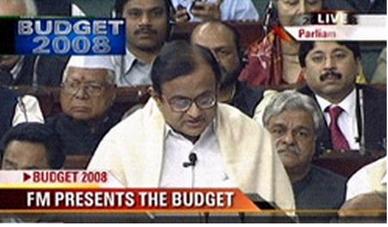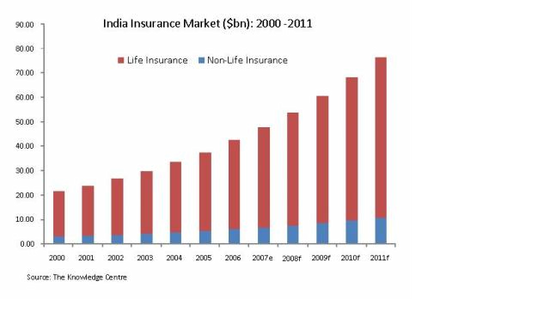As per the current (Mar 06) FDI norms, foreign participation in an Indian insurance company is restricted to 26.0% of its equity / ordinary share capital. The Union Budget for fiscal 2005 had recommended that the ceiling on foreign holding be increased to 49.0%.
The government approved the much-awaited comprehensive Insurance Bill that seeks to raise foreign direct investment (FDI) cap in private sector to 49 per cent from 26 per cent.

Insurance Market in India: Past-Present-Future

FDI Cap 49% from 26%: Impact on Indian Insurance Industry
A higher foreign direct investment (FDI) will
unshackle the insurance industry and drive growth and long-term development
enrich the business by bringing world-class business practices and processes
expand distribution capabilities and deepen market penetration.
Over US$ 2 billion of foreign capital could flow into the country if the Government were to pass the Insurance Amendment Bill that raises the FDI limit.
Scene 1: Change in waive service tax on micro insurance products
The growth of the rural insurance industry necessitates a waiver of the service tax, which currently stands at 10.3 per cent, including education cess.
This tax is detrimental to the growth of the rural insurance industry and insensitive to the plight of rural populace which lacks quality healthcare and is vulnerable to numerous perils, including illness, accidental death and disability, loss of property due to theft or fire, agricultural losses, and disasters of both the natural and man-made varieties.
Rural insurance has an enormous potential for growth and a service tax waiver will make micro insurance products more affordable for the rural populace, and will drive pan-India penetration of this market.
Scene 2: Revision on Service tax on small transactions
There is an urgent need to increase the threshold for the levy of service tax on policies. The present notification exempts small transactions involving premium of less than Rs 50 (except motor insurance) from the ambit of service tax. The threshold limit of Rs 50 which was fixed in 1994 needs urgent revision. Small transactions involving premium up to Rs 1,000 should be exempt from service tax which will benefit the under-privileged sections of our society.
Insurance premium for covering small and medium enterprise risks should be exempt from service tax. For other insurance products, we would like a reduction in the service tax by at least 3-4 per cent.
Scene 3: Exempting personal insurance from service tax
There is an overwhelming demand across all players in the industry that individual health insurance policies should be totally exempt from service tax. Exemption of health insurance from the service tax will make health cover affordable and accessible for the layman. Consequently, cheaper health insurance will increase its pan-India penetration.
Additional IT exemption for householders’ policies and concessional IT rates will give a fillip to home insurance and will also reduce the burden on the government in the event of catastrophes.
Scene 4: Exemption for profit on sale of investments
To encourage general insurance players to be active participants in capital markets, there is a requirement for specific exemption from income-tax on profit on sale of investments. The issue of admissibility of UPR (unexpired premium reserves) as per IRDA regulations rather than as per Insurance Act only, for IT deductions.
The UPR is at present restricted to the extent of limits specified in rule 6E of the Income Tax rules due to which insurance companies need to pay tax beyond their profit disclosed in their audited accounts. Hence, the UPR created as per IRDA regulations should be allowed as per rule 6E.



